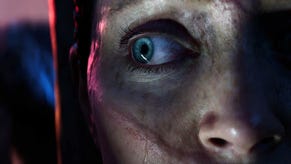How developers left violent combat behind to create kinder games
Level up.
Combat in all of its different forms is the pillar of most games, one that we've come to take for granted. But with the years, whether that's due to hyper-realistic styles making the violence in games seem more gruesome than ever, or simply out of a need for more gentleness in an increasingly relentless world, the number of games that re-think combat or forego it altogether has risen. I've been speaking to the developers of several upcoming games to ask them why they've started to look for alternatives.
"Over the course of your life you just start to think about what you want to put out into the world," Greg Lobanov, developer of Wandersong and the upcoming Chicory, tells me. "On some level, I feel a responsibility to make games about those things. If I'm going to put so much time and work and care into something, I want it to be something that spreads positive ideas."
In Wandersong, weapons combat is replaced with singing - you take control of a little bard who uses his voice in song battles and to shape the world around him. Fresh off a successful Kickstarter, Chicory looks a bit like Zelda: you make your way through a forest and overcome obstacles with the help of a magical paintbrush. Lobanov sees his design choices not as replacements for combat, but as the idea an entire game is based around. He makes games about drawing or about singing, instead.
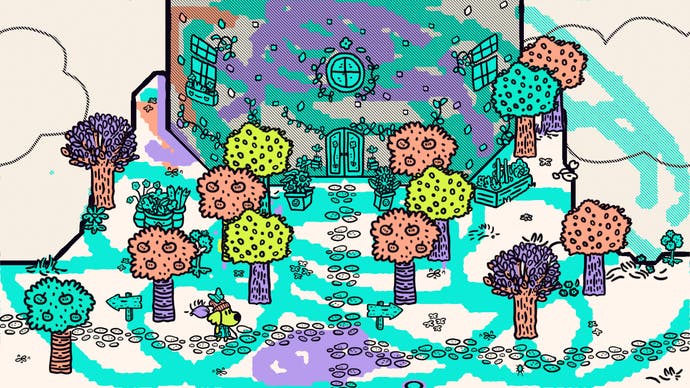
Before he set out to make games independently through his own company Typhoon Studios, Journey To the Savage Planet designer Alex Hutchinson worked on a number of blockbuster titles that shaped his view of combat in games. For a while he worked on The Sims games at Maxis. "If you look at Maxis' full catalogue, it's not just that their gams have non-violent paths, it's that they're more often than not completely non-violent and still successful. And better still, many are still completely unique games to this day with little to no competition," he says. "We made toys and toy boxes more than games you could 'beat' and I started to become obsessed with the idea of bringing that to genres that maybe didn't have that option by default." He found a small way to do that by the secret ending in Far Cry 4 and the Homestead in Assassin's Creed 3 - isolated instances, but options nonetheless which added some important time away from killing.
The idea of games as being something more than escapism and entertainment crops up with every person I talk to. When Alex Kanaris-Sotiriou and Tom Jones of indie studio Polygon Treehouse and set out to make Röki together with narrative designer Danny Salfield Wadeson, they saw it as an opportunity to make a game without combat just because. Despite his previous work on the Killzone franchise at the now-defunct Guerilla Cambridge, Kanaris-Sotiriou points out the idea for a game with a focus on kindness didn't originate with any sort of combat fatigue. "We enjoy all types of genres but when we started looking at the setting and tone for our game we wanted to tackle something that was more personal, more contemplative with more of an emphasis on the emotional core of the game," he says. "We liked the idea of our hero, Tove, with the innocent eyes of a child being able to look past the monstrous appearance of the creature she encountered and be able to see the humanity underneath and try to help them in their struggles."
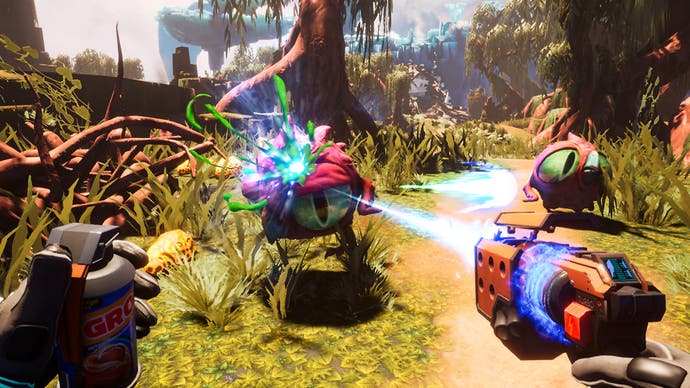
Salfield Wadeson agrees and adds another important definition of kindness: "There is the kindness Tove shows to the monsters, but also she must show herself kindness too. This is a personal reflection, but I'm sure it's very relatable and internal forgiveness isn't something many games deal with. There are definitely crazy action games or violent sci-fi romps that I love - but when it comes to helping create something, what I'm drawn to are opportunities to explore this very human, very urgent need for kindness to start within."
Nicolas Guérin, creative director at Thunder Lotus Games, processed the death of a beloved relative with Spiritfarer, and the result is as emotional as it is calming. He points out the financial risk that leads to developers and publishers being more conservative with their ideas:
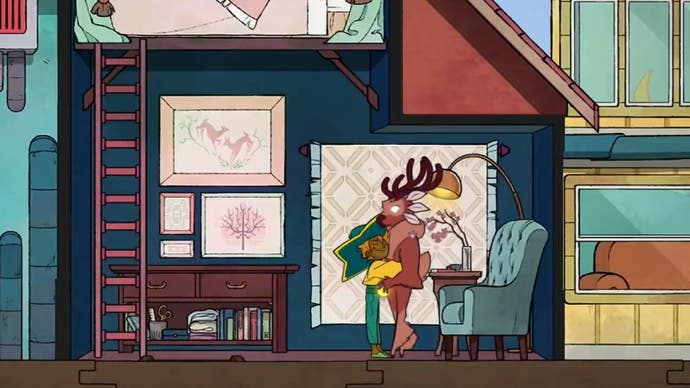
"Unfortunately, many large companies need to move very large amounts of units to be profitable, and this old idea that gamers still are the same demographic - young white men - lingers on, and guides developers towards certain choices in game design."
Lobanov echoes the creative and financial risk of going against a formula: "You have to reinvent the wheel, so to speak, which means you need to really think through all the parts of what you're making and how to express those same feelings without using violence, which is the default.
"Not only that, but you'll be treading new experimental territory since there are so few models to follow. I genuinely enjoy making weird things nobody has tried before, so that helps a lot. Not everybody has that same inclination, not to mention the privilege to take financial risks. For me, Kickstarter helped mitigate a lot of that."
Hutchinson adds that mechanically, guns have become a safe bet for satisfying gameplay: "[Guns are] one of the most perfect mechanics we've yet discovered: in-built risk reward, visually spectacular, the act of aiming is juicy and analogue and rich, and it's clean in a functional sense. If you win, the other actor is eliminated and can be removed from play, while if you lose, we can reset. Lots of other mechanics, especially social mechanics, end with everyone still lurking and existing, which means the illusion collapses quickly. That's not a problem you have with guns."
"Gaming is often an intrinsically selfish process, in which as a player you have to accumulate things for you, beat others or overcome the various challenges a game has to offer," Guérin says.
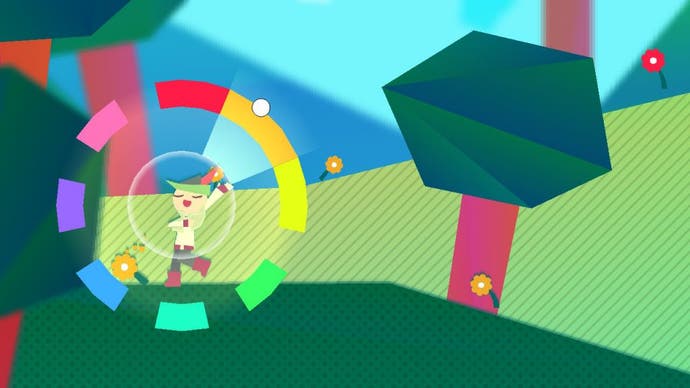
"Kindness is by definition, selfless, so mechanically speaking, it means requiring the player to do things that he/she won't directly benefit from, but will be beneficial only to other entities. Because kindness is altruistic, game design has to refrain from creating sub loops of indirect use by the player, for example by giving characters gifts so they like you."
While everyone agrees on the benefits of games facilitating kindness, doing so may be possible to do so while still using combat. Kanaris-Sotiriou uses the recent God of War as an example, while Hutchinson allows you to shoot enemies in Journey to the Savage Planet. He makes it clear however that Savage Planet is an exploration game first and foremost.
"We had a hope early on that we could have an entirely non-violent path, and there are plenty of things we included from those tests - you can feed the creatures to gain resources for example - but with a small team and a tight time frame we didn't have the luxury of infinite experimentation, which meant in the end we leant on things we'd done before and there's a lot of combat in there now to fill out the experience. You can avoid a lot of it though - it's most definitely not a shooter even though you can and do need to fire your gun."
Greg Lobanov believes that while moving away from established systems is a lot of work, that work has far-reaching benefits beyond simply making something wholesome. "I think a tide change is coming, because as more people make kind things, the compass of culture will slowly change course to follow."
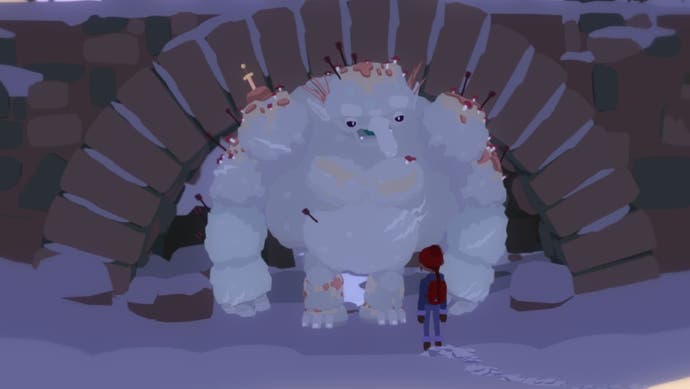






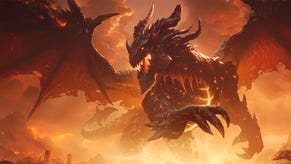
.png?width=291&height=164&fit=crop&quality=80&format=jpg&auto=webp)
